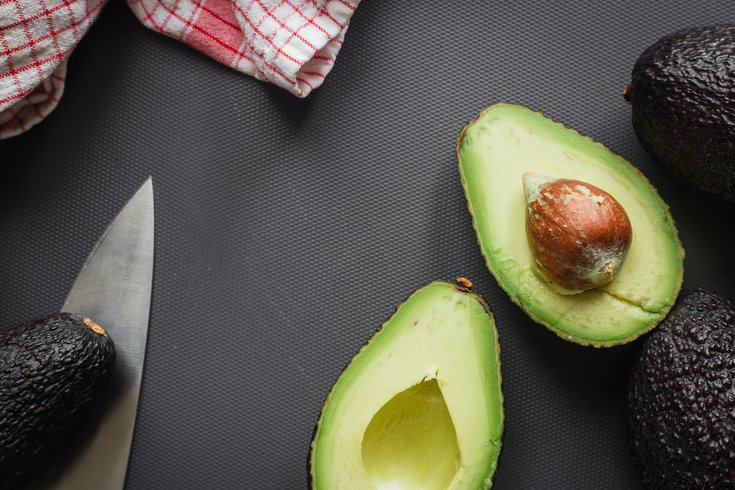
April 08, 2022
 Louis Hansel/Unsplash
Louis Hansel/Unsplash
Consuming at least two servings of avocado each week is associated with lower risk of cardiovascular disease, a study from the American Heart Association finds.
Eating two or more servings of avocado each week is associated with a lower risk of developing heart disease, particularly when used as a replacement for other fats, like butter, according to a study from the American Heart Association.
Avocados are well-known as a great source of several nutrients, including vitamins A, K, B and E. The fruit contains monounsaturated fats, which are considered healthy fats, rather than saturated or trans fats. They are also a good source of soluble fiber, which helps move bad cholesterol out of the body while retaining good cholesterol.
The study found that higher avocado consumption was associated with a 16% lower risk of cardiovascular disease and a 21% lower risk of coronary heart disease. People with higher intakes also typically had higher energy intake and better diet quality, defined as a diet with a large quantity of quantity of fruits and vegetables, whole grains, nuts, yogurt and cheese.
"These findings are significant because a healthy dietary pattern is the cornerstone for cardiovascular health, however, it can be difficult for many Americans to achieve and adhere to healthy eating patterns," said Cheryl Anderson, chair of AHA's Council on Epidemiology and Prevention.
Researchers found that replacing half of a daily serving of margarine, butter, egg, yogurt, cheese or processed meats with avocado was linked to a 16-22% lower risk of cardiovascular disease.
Though plant-based oils and nuts are also considered a source of healthy fat, substituting avocado with those foods showed no additional benefit to cardiovascular health.
The study examined a group of 68,786 women and 41,701 men every four years over a 30-year period, with the earliest participants joining in 1986. None of the participants had any previous history of cancer, coronary heart disease or stroke. Participants filled out food intake questionnaires, which determined the amount and frequency of the avocados they were consuming.
Given that avocados are "well-accepted" foods, said Lorena Pacheco, lead author of the study, the findings may be helpful for doctors and registered dietitians to suggest avocados as alternatives to butter or margarine.
Kristian Morey, clinical dietitian at Mercy Medical Center, told Verywell that avocados are a "versatile" fruit that can be used in many recipes. Nutrition experts suggest adding it to a smoothie or using it as a spread. However, Morey noted that considering some foods as the "healthiest" options can be stressful to people who have trouble accessing that food.
"It can perpetuate all or nothing thinking," Morey said, adding that describing foods as "good or bad" can lead to people to project those labels on themselves based on the foods they are eating.
Anderson recommended the Mediterranean diet as healthy eating habits rich in vegetables and fruits. While no food can provide a one-size-fits-all solution, she said, avocado is popular, accessible and easy to incorporate into meals.
Avocado toast has become a mainstay on breakfast and brunch menus at many restaurants. Though plain avocado toast is not considered entirely healthy given the lack of protein, adding an egg or another form of lean protein can make the trendy food a full meal.
Another popular suggestion is using avocado as a replacement or as an add-on to yogurt in smoothie recipes. Though yogurt has health benefits of its own, providing healthy fats and healthy bacteria, adding avocado could be an easy way to incorporate the heart healthy fruit into a diet.
Lisa Drayer, nutrition contributor at CNN, recommends using avocado in soups, dips and chocolate truffles. The fruits are heavy in unsaturated fat, which can help lower cholesterol. Unlike olive oil, they're also high in fiber, which can keep people full for longer periods of time.